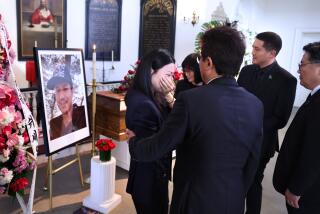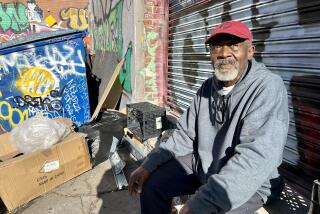A Casualty of Freedom, Stanley Paid for Stylish Address With His Life
- Share via
NEW YORK — Solitary sea gulls bob and freighters plow the cold waters of the Verrazano Narrows. Through the wicket arches on the bridge above, traffic streams. Tan high-rises bunch along the far Brooklyn shore.
This crowded panorama costs buyers of townhouse apartments abutting Staten Island’s South Beach thousands. For Stanley Kryshak, who built a home of scavenged planks and cardboard under the boardwalk, it cost more. At age 66, he froze to death there this winter.
He hadn’t had a real address, at least not steadily, since he checked out of a bed-and-board home near the beach in August, 1986. But he was by no means the anonymous, lost vagrant of stereotype.
A lot of people knew him, called him Stanley, sang as he played his harmonica beside a fire on the beach in warm weather, bought him morning doughnuts at Frank’s Deli. They say they looked forward to seeing him each day. They made a kind of second family for him, if not a home.
Retracing Kryshak’s steps, what’s curious is that he could have died the way he did, given all the concern that people--including his former wife and his daughter and son--had for him.
And yet most, although caring, shook their heads and voiced comments similar to those of Ed DeMayo, a bartender at the Casablanca Tavern: “It’s a shame he went that way. He didn’t want to be helped.”
“I saw lawyers, I saw doctors, I saw police,” the homeless man’s ex-wife, Carole, said, “but in the state of New York, you can’t violate his rights if he doesn’t want to be helped.
“It’s sad, because this was a good and brilliant man. It was a wasted life.”
Along Sand Road, the strip of pizza places, bars and arcades running back from the beach where Kryshak lived, people remembered a man who at times had dressed smartly but who “neglected himself” in the months before his death, a vodka drinker who usually didn’t show it, a rummager in trash cans who sometimes offered to repay loans.
“I think I owe you money,” he once told Liliana Ammirati when he stopped in Frank’s. He’d just received his Social Security check and offered her a $10 bill.
“I said, ‘Stanley, you got $500. Get a room,’ ” she recalled. “He said, ‘Yeah, yeah, I’ll get a room.’ ”
Angela Amato remembered the evenings Kryshak spent with local teen-agers around a fire on the beach, playing Italian songs or something else on the harmonica he always carried.
“He was very good with children,” Amato said.
Cheerful, smart, a good conversationalist, DeMayo recalled.
“There wasn’t anything he couldn’t do,” Carole Kryshak agreed, calling her husband of 24 years a “borderline genius.”
Trained as an electronics technician, he had worked for United Airlines, among other companies. “He did carpentry, he played music, he did calligraphy. But he was also a manic-depressive,” she said.
She hadn’t been aware of his history of mental illness when they married. He was fine for four or five years.
Was there any obvious catalyst then?
“Maybe having children, having a family, responsibilities,” Carole Kryshak said.
He began to have wild swings of mood. In manic periods, he was “like a mad scientist,” she said--sleeping one hour in 24, taking apart and reassembling household appliances, running wires everywhere.
“He could spend $1,000 in a day, on nothing,” and that, she said, is why she divorced him: to make sure that she didn’t lose the house.
During depressions, “he’d go into a room and hide.” He drank turpentine and swallowed bottles of aspirin.
Treatments were tried--shock treatments that left him with a terror of hospitals, prescribed drugs he would neglect to take.
Again, Carole Kryshak wondered aloud, “If he could lead a normal life with medication, doesn’t it make sense to force him to take it?”
She spoke of the much publicized recent case of a homeless woman forcibly removed from a Manhattan street by city officials who said she was mentally ill and endangering herself. The woman was released Jan. 19 after 83 days in a hospital psychiatric ward. Because of her release, New York’s highest court earlier this month weedismissed a lawsuit filed by civil libertarians seeking to legally test the city’s program of forcibly hospitalizing mentally ill street people.
Carole Kryshak said her husband was never violent toward his family, but, “We were mentally abused.”
Nonetheless, the family didn’t move out until the night he turned the kitchen gas jets on before going to bed. Carole Kryshak said she happened to awaken and turned them off.
Living on his own, Kryshak burned himself out of an apartment, wound up in a hospital, then a shelter, and, in January, 1983, the New Broadview Manor home for adults, a short stroll from the beach in Staten Island.
His Social Security checks covered room and board, with $86 a month left over, according to the manager, Ludwig Marcovici.
When Kryshak checked out 3 1/2 years later, no one could stop him. In an interview on a recent icy day, Marcovici noted that the home had made announcements that morning recommending that residents stay inside but that the door was not locked.
Without commenting on Kryshak’s case, Marcovici, a native of Romania, said that in central Europe, Gypsies live outdoors by their own rules. Some homeless people in this country are just that way. “At least they’re free.”
The home’s bookkeeper joined the discussion. She wouldn’t give her name but said she was also from Romania.
“With freedom you have a few casualties,” she said. “In a dictatorship you have more.”
From the adult home, Kryshak apparently moved in for a time with friends but was soon living on the beach. A year ago, several frostbitten toes had to be amputated.
“It was like a miracle--you know, maybe he learned his lesson,” Carole Kryshak said. Her daughter, Donna Wisniewski, talked with doctors about his mental illness, but she was told he was hospitalized for frostbite and that’s all they could treat, her mother said.
The issue became moot when Kryshak walked out in pajamas and hospital slippers. Eventually he claimed his place under the boardwalk. “He just barricaded it with wood and cardboard and he lived in there,” DeMayo said.
He and other friends said Kryshak deteriorated in the months before he died, his hair grew long, and they worried about him as it grew colder.
His daughter tried time and again to persuade him to move inside. He finally told her to mind her own business, Carole Kryshak said.
He accepted donated quarters but kept up a chipper front. “The last thing he said to me,” DeMayo remembered, “he said, ‘How’m I doin’?’ And I said, ‘You’re doing good.’
‘Heard It on Radio’
“I was thinking about him that Sunday morning,” DeMayo said. “I heard it on the radio. I said, ‘God . . . Stanley.’ ”
A man walking his dog found the body on the beach Nov. 22. The medical examiner “cleared it as frozen,” said police Lt. William Quinn.
Kryshak’s family had wanted to put his harmonica in his coffin, but it was never found.
“There was such a difference between the man that was and the man that died,” Carole Kryshak said. “But he was free. And that’s the way he wanted it.”
More to Read
Sign up for Essential California
The most important California stories and recommendations in your inbox every morning.
You may occasionally receive promotional content from the Los Angeles Times.










